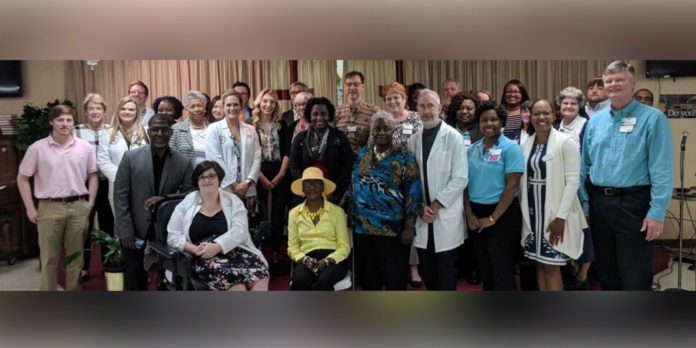MACON – Mercer University School of Medicine (MUSM) is partnering with Bethel CME Church and Navicent Health on the H.O.P.E. (Health Outreach Prevention and Enrichment) Initiative, a collaborative effort to improve the health status of the Macon community from different perspectives.
The H.O.P.E. Initiative – named in honor of Dr. Thomas Hope, local neurologist and MUSM professor since 1982 – brings physicians, healthcare workers and medical students together with church leaders to promote the health of church members and the community at large.
“The H.O.P.E. Initiative is a unique community collaboration and a meaningful opportunity for our medical students to integrate service-learning and community medicine,” said Keisha R. Callins, M.D., MPH, clinical assistant professor in MUSM’s Department of Community Medicine. “Bethel CME, under the leadership of Pastor Bruce Burns Sr., is ideally located in the nearby Unionville community. This an honest outreach effort that will hopefully benefit a local community just miles from Mercer and Navicent.”
“In the training of student physicians, there is a need for students to have an early start to improving their proficiency for doing physical exams,” added Dr. Hope. “It is very good idea for students in a medical school emphasizing primary care to come in regular, direct contact with patients most in need of primary care.”
At its inaugural event in October, the healthcare team addressed hypertension, examining 16 church members and providing blood pressure checks and blood draws as needed. Those who required additional service were referred for additional testing and instructed to follow up with their physicians.
“Through the H.O.P.E. Initiative, we are be able to see firsthand the challenges people face to gaining access to medical care and managing chronic diseases, such as hypertension,” said first-year medical student Alyse Ragauskas. “By initiating the process and connecting patients with providers, we are able to decrease some of the barriers people have to medical access.”
For those who do not have a physician, H.O.P.E. Initiative care coordinators are able to assess the individual’s needs and refer him or her to a community partner who will best meet that person’s health, financial and transportation needs. Those community partners currently include Community Health Care Systems, First Choice Primary Care, Macon Volunteer Clinic, Mercer Medicine and the W.T. Anderson Clinic.
“Our long-term goal is to provide this service one to two Sundays per month, and also provide it on weekdays as needed. We are piloting this intervention program at Bethel CME, and look forward to expanding the program to include other congregations,” Carol Babcock, director of Healthy Communities, Navicent Health, said of the partnership with Mercer and Bethel CME.
Sixty-five percent of respondents to a Community Health Needs Assessment conducted by Navicent Health in 2015 reported attending a church service within the last month, and plans were made to create a faith-based outreach program. One result is the H.O.P.E. Initiative, which is intended to serve as an intermediary between the faith and health communities through educational programs and select screenings in local churches.
About Mercer University School of Medicine (Macon, Savannah and Columbus)
Mercer University’s School of Medicine was established in 1982 to educate physicians and health professionals to meet the primary care and health care needs of rural and medically underserved areas of Georgia. Today, more than 60 percent of graduates currently practice in the state of Georgia, and of those, more than 80 percent are practicing in rural or medically underserved areas of Georgia. Mercer medical students benefit from a problem-based medical education program that provides early patient care experiences. Such an academic environment fosters the early development of clinical problem-solving and instills in each student an awareness of the place of the basic medical sciences in medical practice. The School opened a full four-year campus in Savannah in 2008 at Memorial University Medical Center. In 2012, the School began offering clinical education for third- and fourth-year medical students in Columbus. Following their second year, students participate in core clinical clerkships at the School’s primary teaching hospitals: Medical Center, Navicent Health in Macon; Memorial University Medical Center in Savannah; and The Medical Center and St. Francis Hospital in Columbus. The School also offers master’s degrees in family therapy, preclinical sciences and biomedical sciences.










